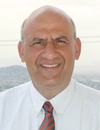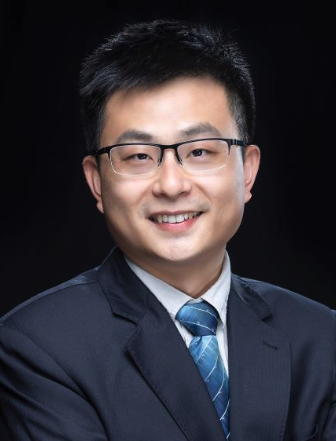Speakers

Prof. P. Takis Mathiopoulos
IEEE Fellow
National and Kapodistrian University of Athens, Greece
Biography:
P. Takis Mathiopoulos received the Ph.D. degree in digital communications from the University of Ottawa, Ottawa, Canada, in 1989. From 1982 to 1986, he was with Raytheon Canada Ltd., working in the areas of air navigational and satellite communications. In 1989, he joined the Department of Electrical and Computer Engineering (ECE), University of British Columbia (UBC), Vancouver, Canada, as an Assistant Professor and where he was a faculty member until 2003, holding the rank of Professor from 2000 to 2003. From 2000 to 2014, he was the Director (2000 - 2004) and then the Director of Research of the Institute for Space Applications and Remote Sensing (ISARS), National Observatory of Athens (NOA). In 2014 he was appointed Professor of Telecommunications at the Department of Informatics and Telecommunications, National and Kapodistrian University of Athens, Athens, Greece. He also held visiting faculty long term honorary academic appointments as Guest Professor at Southwest Jiao Tong University (SWJTU), Chengdu, China, and Guest (Global) Professor at Keio University, Tokyo, Japan. His research activities and contributions have dealt with wireless terrestrial and satellite communication systems and network as well as in remote sensing, LiDAR systems, and information technology, including blockchain systems. In these areas, he has coauthored more than 150 journal papers published mainly in various IEEE journals, 1 book (edited), 5 book chapters, and more than 160 international conference papers. Dr. Mathiopoulos has been or currently serves on the editorial board of several archival journals, including the IET Communications as an Area Editor, the IEEE Transactions on Communications, the Remote Sensing Journal, and as Specialty Chief Editor for the Arial and Space Network Journal of Frontiers. From 2001 to 2014, he has served as a Greek Representative to high-level committees in the European Commission and the European Space Agency. He has been a member of the Technical Program Committees (TPC) for numerous IEEE and other international conferences and has served as TPC Vice Chair of several IEEE conferences. He has delivered numerous invited presentations, including plenary and keynote lectures, and has taught many short courses all over the world. As a faculty member UBC, he has been awarded an Advanced Systems Institute (ASI) Fellowship as well as a Killam Research Fellowship. He is also the co-recipient of three best international IEEE conference paper awards and has received by the IEEE Communication Society the Satellite and Space Communication Technical Committee "2017 Distinguished Service Award" for outstanding contributions in the field of Satellite and Space Communications.
Title:A Joint Ray Tracing and Stochastic Methodology for Sensing Channel Modeling in Vehicle-to-Everything Systems
Abstract: A new sensing channel modeling methodology which jointly considers ray-tracing (RT) and stochastic methods, to accurate and efficient model sensing channels for vehicle-to-everything (V2X) applications will be introduced, and its performance will be evaluated. For the former, moving targets are modeled through accurate RT simulations while for the latter a statistical approach is used for generating complex environmental clutter by emphasizing for the first time individual object modeling. This approach is used to form a feature library of objects which ensures space-time consistency while significantly improving the modeling speed. The channel transfer functions generated by RT and stochastic methods are jointly considered through coherent superposition to form a more complete sensing channel which includes both clutters and targets. To verify its effectiveness and accuracy, a comprehensive experimental study has been conducted taking systematic measurements using a 77-GHz mmWave radar as it is the prevalent equipment for sensing used for intelligent driving applications. We have considered a typical V2X scenario, with the radar deployed on vehicles traveling along roads at an urban intersection. The experimental results obtained have demonstrated that the accuracy in target distance detection and velocity estimation has improved leading to errors of less than 0.5 m and less than 0.2 m/s, respectively, while for clutter modeling, the error of power is 3 to 6 dB. Moreover, compared to traditional RT methods, the proposed approach is 20 times faster. Through the proposed methodology, realistic sensing channel data can be obtained in a systematic, effective, and accurate manner, facilitating research of sensing-assisted communication applications.

Prof. Jinjian Wu
Xidian University, China
Biography:
Jinjian Wu received the B.Sc. and Ph.D. degrees from Xidian University, Xi’an, China, in 2008 and 2013, respectively. From 2011 to 2013, he was a Research Assistant with Nanyang Technological University, Singapore, where he was a Postdoctoral Research Fellow from 2013 to 2014. From 2015 to 2019, he was an Associate Professor with Xidian University, where he has been a Professor since 2019. His research interests include visual perceptual modeling, biomimetic imaging, quality evaluation, and object detection. He received the Best Student Paper Award/candidate at the ISCAS 2013/CICAI 2021. He has served as an Associate Editor for the journal of Circuits, Systems and Signal Processing (CSSP), the Special Section Chair for the IEEE Visual Communications and Image Processing (VCIP) 2017, and the Section Chair/Organizer/TPC Member for the ICME2014-2015, PCM2015-2016, PRCV2021-2025, AAAI2019-2025, CICAI2021-2025, and ACMMM 2021-2025.
Title: A novel bionic imaging and its intelligent processing
Abstract: It is great demand for effective imaging of moving targets in many industries, such as industrial intelligence manufacturing. However, traditional non-high-speed imaging is easy to cause blur, while high-speed imaging technology is too expensive. Inspired by the mechanism of biological vision, a novel bionic imaging technique and its corresponding intelligent processing algorithms is introduced in this report, which can effectively capture moving targets with low-cost.

Prof. Guojian Cheng
Xijing University & Xi'an Shiyou University, China
Biography:
He has long been engaged in teaching and research in artificial intelligence and machine learning. The main research topics involve the application of artificial intelligence and machine learning in geoscience and petroleum engineering. His research interests include artificial intelligence, machine learning, data science, big data technology, pattern recognition, data mining, image processing, and intelligent reservoir engineering. He has presided over and completed two National Natural Science Foundation of China (NSFC) projects, "Theoretical and Practical Research on Hybrid Soft Computing System for Reservoir Simulation" and "Research on Reservoir History Fitting Agent Model Based on Kernel Vector Machines". During his visit to the Department of Petroleum Engineering of West Virginia University, he organized a series of seven lectures on "Computational Intelligence and its Applications in Petroleum Engineering".
He has published more than 200 articles in related academic research fields and international conferences, and more than 20 books in the fields of artificial intelligence, big data and machine learning. He initiated the "Intelligent Digital Oilfield Forum (iDOF)" and the annual academic conference, and gave lectures on "Artificial Intelligence and Digital Oilfield Technology Application and International Dynamics" for oilfield enterprises and institutions; he has given lectures on "Artificial Intelligence, the Future is Now" in the training courses for cadres of provincial organs. "He has been invited to be the speaker and chairman of many international academic conferences.
He is a member of CCF of China Computer Society, a member of Microelectronics Committee of CCF of Shaanxi Province, a director of Computer Education Society of Shaanxi Province, a member of SPE of International Society of Petroleum Engineers; a member of European Geophysical Society; an editorial board member of Journal of Xi'an University of Petroleum (Natural Science Edition); and an assessor of National Natural Science Foundation of China. He has been the leader of the master's program of Software Engineering and Theory in the School of Computer Science of Xi'an Petroleum University, the director of the Institute of Intelligent Digital Oilfield, and was honored with the title of Outstanding Returned Scholar in Shaanxi Province in 2009.
Title: AI4S and Its Application in Geological Energy Development
Abstract: This speech begins by noting that the 2024 Nobel Prizes in Physics and Chemistry were awarded to research deeply related to AI, marking the first year of the deep integration of AI and scientific discovery. The core of AI4S lies in applying AI technologies to scientific research while using domain-specific knowledge to improve AI algorithms and architectures. The speech provides a detailed introduction to the application of AI4S in physics-informed deep learning, especially in the context of geological energy extraction, such as optimizing the extraction process through AI technologies to enhance efficiency and reduce costs. It also explores the application of AI4S in large-scale Earth science models, including how to process and analyze massive geological data using AI technologies and how to conduct geological simulations and predictions using AI models. Additionally, the speech addresses the future challenges faced by AI4S, such as data scarcity, limited computing power, high energy consumption, and poor interpretability, and discusses how to solve these problems through multidisciplinary cooperation and technological innovation. The third part mentions the applications of AI in various fields such as education, daily life, and healthcare, such as AI teaching assistants, intelligent lesson preparation, and smart Q&A, showcasing the broad application prospects of AI technologies. Meanwhile, the speech emphasizes the core role of AI technologies in scientific research, especially in driving technological breakthroughs, empowering industries, and shaping the workforce. It also introduces the application of AI4S in the five major paradigms of scientific research methods, including empirically driven, theory-driven, computation-driven, data-driven, and intelligence-driven approaches. AI4S provides new tools and methods for scientific research by changing the way scientists acquire and disseminate knowledge and by generating, extracting, and annotating large-scale scientific datasets. Finally, the speech summarizes the application cases of AI4S in geological energy development, such as reservoir surrogate modeling, geological inversion, and geothermal development parameter tracing, and discusses the challenges and future development directions of AI4S in these areas. The speech highlights the important role of AI4S in promoting the intelligent and refined management of geological energy development, as well as its potential in achieving energy transition and the "dual carbon" goals.

Assoc. Prof. Feng Yin
Presidential Young Fellow, IEEE Senior Member
The Chinese University of Hong Kong (Shenzhen), China
Biography:
Feng Yin received his B.Sc. degree from Shanghai Jiao Tong University, China, and his M.Sc. and Ph.D. degrees from Technische Universitaet Darmstadt, Germany. From 2014 to 2016, he was a postdoc researcher with Ericsson Research, Linkoping, Sweden. Since 2016, he has been with The Chinese University of Hong Kong, Shenzhen and is currently a tenured associate professor of the School of Science and Engineering and affiliated with the newly established School of Artificial Intelligence. His research interests include statistical signal processing, Bayesian learning and optimization, and sensory data fusion. He has published more than 100 top-tier journal and conference papers, and 20 patents/standards. He was a recipient of the Chinese Government Award for Outstanding Self-Financed Students Abroad in 2013 and the Marie Curie Young Fellowship from the European Union in 2014. He was the finalist for the IEEE CAMSAP best paper award in 2013 and received the best paper award of ICSINC conference in 2022. He has served as Associate Editor for the Elsevier Signal Processing Journal and currently serving as the Associate Editor for the IEEE Transactions on Signal Processing. He is an IEEE senior member, a member of the IEEE Machine Learning and Signal Processing (MLSP) technical committee and a member of the IEEE SPS scholarship committee.
Title: Towards Flexibility and Learning Efficiency of Gaussian Process State-Space Models
Abstract: The Gaussian process state-space model (GPSSM) has garnered considerable attention over the past decade. However, the standard GP with a preliminary kernel, such as the squared exponential kernel or Matérn kernel, that is commonly used in GPSSM studies, limits the model's representation power and substantially restricts its applicability to complex scenarios. To address this issue, I will present a new class of probabilistic state-space models called TGPSSMs, which leverage a parametric normalizing flow to enrich the GP priors in the standard GPSSM, enabling greater flexibility and expressivity. Additionally, I will present a scalable variational inference algorithm that offers a flexible and optimal structure for the variational distribution of latent states. The proposed algorithm is interpretable and computationally efficient due to the sparse GP representation and the bijective nature of normalizing flow. Lastly I will demonstrate some experimental results on synthetic and real datasets to corroborate that the proposed TGPSSM outperforms several state-of-the-art methods.
Copyright© SPCS 2025
2025 6th International Conference on Signal Processing and Computer Science(SPCS 2025) http://icspcs.org/

